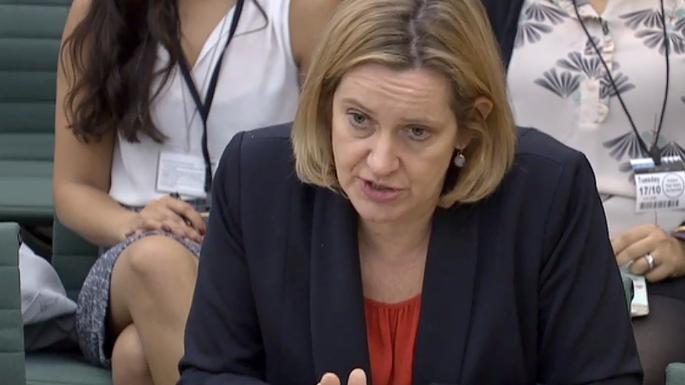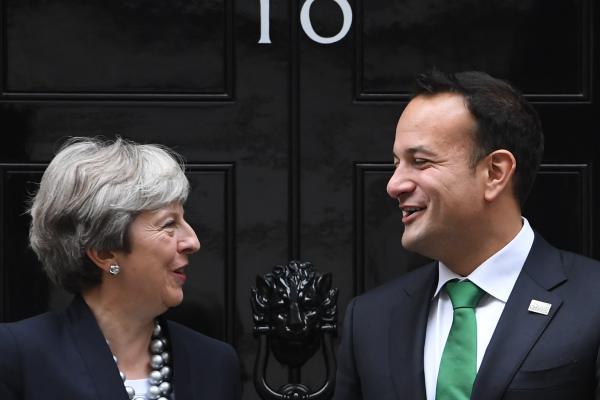
Two of Theresa May’s most senior ministers contradicted each other on the desirability of a no deal Brexit as tensions over the government’s strategy for the negotiations resurfaced.
David Davis, the Brexit secretary, told MPs this afternoon that keeping the option of crashing out of the EU without a deal was “sensible”. But under an hour later, Amber Rudd, the home secretary, described that scenario as “unthinkable”.
Mr Davis, who joined Theresa May in Brussels yesterday for a “constructive” dinner with Jean-Claude Juncker and Michel Barnier, insisted the government was trying to reach a deal but defended the no deal option.
Asked by Anna Soubry, a Europhile Tory backbencher, whether he agreed that there the election gave the government no “mandate for no deal”, the Brexit secretary replied: “Firstly it gave us a bigger mandate than it gave [Labour]… and the second thing to say to her is we are seeking to get a deal – that is by far and away the best option.
“The maintenance of the option of no deal is for both negotiating reasons and sensible security – any government doing its job properly will do that.”
But less than an hour later Ms Rudd, appearing before the Commons home affairs committee, adopted a far more hostile stance to a no deal Brexit.
“I think it is unthinkable that there would be no deal,” she said. “It is so much in their interest as well as in ours. [It is] in their communities’, in their families’, in their tourist interests, to have something in place. We will make sure there is something between them and us to maintain our security.”
The Liberal Democrats said Mr Davis was “living in fantasy land”. The party’s Brexit spokesman, Tom Brake, said: “David Davis claims those warning about a ‘no Brexit’ deal are scaremongering, so does that include his cabinet colleague Amber Rudd?
“The Brexit Secretary is living in fantasy land. There’s no way the government can negotiate a final deal in time with the EU when cabinet ministers can’t even agree amongst themselves.
“David Davis is either sneakily pushing us towards a no-deal, or has no idea what he’s doing. Either conclusion spells chaos for the British people and businesses.
“This underlines why the public must get the final say, with the choice to avoid a chaotic Brexit and stay in the EU.”
In Luxembourg Mr Barnier said he used the “good working dinner” to tell Mrs May its as “very important to maintain this constructive dynamic in the coming two months”.
“I am ready to intensify negotiations, to intensify the rhythm of the negotiations, but to succeed in that we need to put things in the right order. One step after another, and for the moment we are not at the first step,” he said.
The Frenchman warned that the agreement for “acceleration”, hailed by Downing Street as progress after the meeting, still depended on further British concessions.
“I said three weeks ago I am ready to accelerate the rhythm, but to accelerate it takes two,” he said.
EU diplomats have described the prime minister’s dash to Brussels last night as “without much point” in terms of this week’s summit and as a sign of “growing desperation in the Conservative government”.
“If the British prime minister thinks we are going to bend over backwards to help her survive then she is wrong,” said an ambassador.
A senior EU official said the he expected European leaders to give a “green light” to begin preparatory talks on a transition and trade deal with Britain in acknowledgment of concessions made by Mrs May last month.
“May’s speech in Florence unlocked the negotiations,” he said. “Before the speech many capitals believed we were heading for a no deal scenario. After Florence it seems a deal is still in reach. The 27 want to kickstart negotiating a mandate for our negotiator on the next step.”
Mrs May will set out her “Brexit strategy at dinner on Thursday night”, said a senior EU official close to talks before the EU’s 27 other leaders discuss progress at a meeting without her on Friday
“We do not expect any new initiatives form London,” he said.
Bert Koenders, Dutch foreign minister, said the agreement to begin work on beginning trade talks in December was good for both the EU and British sides.
“It is important that we already can prepare right now what can be the next stage,” he said. “I think that is important right now also for the UK.”
However Samuli Virtanen, the Finnish Europe minister, said that splits in Mrs May’s cabinet are the biggest problem facing progress in talks.
“It seems that at the moment that the EU 27 is more unanimous than the UK one, so that’s one of the main problems here,” he said. “Sometimes it’s very difficult to understand what Britain really wants from these negotiations.”
It came after a claim from a leading ally of Angela Merkel that Boris Johnson was preventing Theresa May from offering sufficient money for the Brexit divorce bill to allow trade talks to begin.
Michael Fuchs, the deputy chairman of Mrs Merkel’s CDU/CSU coalition in the German parliament, said he thought the prime minister would bring forward proposals on Britain’s financial obligations that could break the deadlock in negotiations if she was not plagued by “internal trouble” in the Conservative Party.
Mr Fuchs spoke after Mrs May attended a working dinner in Brussels with the European Commission president Jean-Claude Juncker and the chief negotiator Michel Barnier, which offered little sign of tangible progress.
He told BBC Radio 4’s Today programme: “You have to accept that there are a lot of things to be paid. Let me just say, pensions, which is not solved. This problem has to be solved and the UK has to come up with decent proposals.” Asked about the offer in Mrs May’s Florence speech, he replied: “We don’t think so, it’s not a decent proposal, it’s a proposal but it’s not enough.”
Turning his fire on the foreign secretary, he went on: “I know there are internal problems, whatever she is offering, Boris Johnson is saying it’s too much.
“I don’t know what his influence [is], it seems to be pretty strong because otherwise she would come up with other proposals I guess, and the problem is she has internal trouble in the Tories.”
Asked if Mr Johnson should be sacked, he said: “Of course not. I am critical, because [of] what he said — not a single cent to the EU — it’s of course not acceptable because you know what kind of duties you have, I mean it’s all on the table.”
Earlier the Irish prime minister suggested the EU might “bend the rules” to protect the “fragile” peace process in Northern Ireland.
Leo Varadkar endorsed plans for the EU to take a “hard-line” in negotiations with Britain, insisting that Britain can’t expect the benefits of membership without following the rules. However, in an interview on BBC Northern Ireland he said a special deal might be possible for Ulster.
“There is a real willingness across Europe to be flexible and creative when it comes to Northern Ireland, to create a unique solution for Northern Ireland if that’s required,” he told BBC NI’s Spotlightprogramme.

Theresa May with Leo Varadkar, who believes that the EU will show enormous flexibility towards Northern Ireland in Brexit deals
Experts believe one “unique solution” could be a separate customs arrangement for Northern Ireland, distinct from the deal struck by the rest of the UK. However, it is unlcear what the impact of such an arrangement would have on Britain’s ability to strike trade deals.
The Irish premier also made clear that the EU was unlikely to bend the rules to accommodate internal British political disputes.
On the Brexit negotiations and the financial settlement between the UK and EU, he said: “You can’t have the benefits of being a member of a club if you don’t obey the rules and you won’t pay the membership fee. So, it is quite a difficult negotiation when people who want to leave the EU in Britain don’t really seem to agree among themselves what that actually means.”
